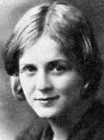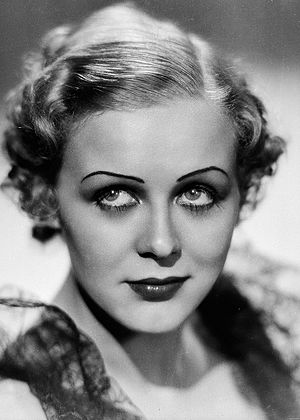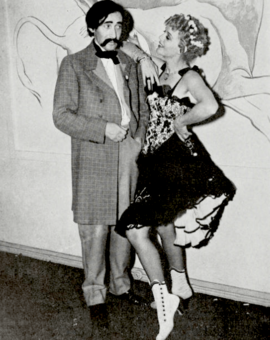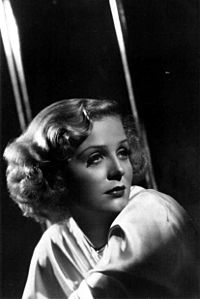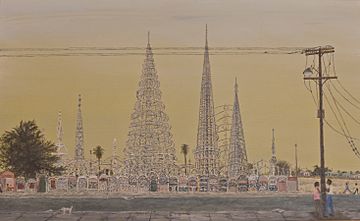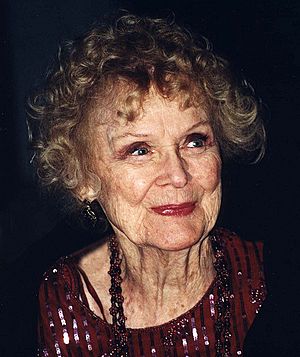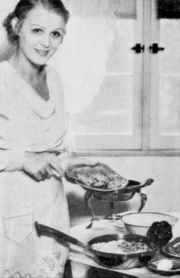Gloria Stuart facts for kids
Quick facts for kids
Gloria Stuart
|
|
|---|---|
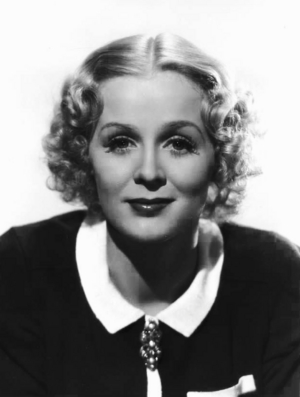
Gloria Stuart in 1937
|
|
| Born |
Gloria Stewart
July 4, 1910 Santa Monica, California, U.S.
|
| Died | September 26, 2010 (aged 100) Los Angeles, California, U.S.
|
| Other names | Gloria Frances Stuart |
| Alma mater | University of California, Berkeley |
| Occupation |
|
| Years active | 1927–2004 |
|
Works
|
Filmography |
| Political party | Democratic |
| Spouse(s) |
|
| Children | Sylvia Vaughn Thompson |
Gloria Frances Stuart (born Gloria Stewart; July 4, 1910 – September 26, 2010) was an American actress, artist, and activist. She was famous for her roles in early Hollywood films. Later in life, she became very well-known for playing the older Rose in the movie Titanic (1997). At the time, Titanic was the highest-earning film ever.
Her role in Titanic earned her a Screen Actors Guild Award. She was also nominated for an Academy Award for Best Supporting Actress and a Golden Globe Award for Best Supporting Actress – Motion Picture.
Gloria Stuart was born in Santa Monica, California. She started acting in high school. After college at the University of California, Berkeley, she performed in plays in Los Angeles and New York City. In 1932, she signed a film contract with Universal Pictures. She starred in many movies, including the horror films The Old Dark House (1932) and The Invisible Man (1933). She also appeared in Shirley Temple musicals like Poor Little Rich Girl (1936).
Around 1940, Stuart acted less in films and focused on theater. In 1945, she stopped acting for a while. She became a successful artist, creating prints, paintings, and miniature books. Many of her artworks are in famous museums.
Stuart slowly returned to acting in the late 1970s. She had small roles in movies like My Favorite Year (1982). Her big comeback was as the 100-year-old Rose in Titanic (1997). Her last film was Land of Plenty (2004). Besides acting and art, Gloria Stuart was an activist. She helped start the Screen Actors Guild and the Hollywood Anti-Nazi League.
Contents
- Early Life and Education (1910–1929)
- Starting Her Acting Career (1930–1934)
- Moving to 20th Century Fox (1935–1939)
- Leaving Hollywood and Becoming an Artist (1940–1974)
- Returning to Acting and Book Design (1975–1995)
- Titanic and Later Years (1996–2010)
- Culinary Interests
- Activism and Politics
- Death and Legacy
- Filmography
- Awards and Recognition
- Selected Artwork
- See also
Early Life and Education (1910–1929)
Gloria Stewart was born on July 4, 1910, in Santa Monica, California. She was the first child of Alice and Frank Stewart. Her mother's family had lived in California for generations. Her father, Frank, was a lawyer. Gloria had two younger brothers, Frank Jr. and Thomas. Sadly, Thomas died young from an illness.
When Gloria was nine, her father passed away. Her mother later married Fred J. Finch. Gloria attended school using the name Gloria Fae Finch. She chose the middle name Frances, after her father Frank.
Stuart went to Santa Monica High School. She loved theater and played the main role in her senior play. She also enjoyed writing and worked as a reporter for a local newspaper.
After high school, she wanted to go to college to leave home. She enrolled at the University of California, Berkeley. There, she studied philosophy and drama. She acted in plays, wrote for the college newspaper, and posed for artists. At Berkeley, she began using the name Gloria Stuart.
While at college, Stuart was interested in the Young Communist League. She felt it helped the poor. She also learned about unfair treatment of workers from her friend Lincoln Steffens. This made her want to support liberal causes.
In 1930, at the end of her junior year, Stuart married Blair Gordon Newell. He was a sculptor. They moved to Carmel-by-the-Sea, California, a town with many artists. Gloria acted in local plays and worked at a newspaper. She also made crafts and worked as a waitress. They lived simply, which Gloria later called "wonderfully bohemian."
Starting Her Acting Career (1930–1934)
Gloria Stuart's acting in Carmel caught the eye of a theater director in Pasadena. She was invited to perform in a play. On opening night, casting directors from big film studios were there. Both Paramount and Universal wanted to sign her. They flipped a coin, and Universal won. Stuart saw herself as a serious theater actress. But she and her husband needed money, so she signed the contract with Universal.
Her first film was Street of Women for Warner Bros. Her second was The All-American. In 1932, Gloria Stuart was named one of the "Most Likely to Succeed" new actresses. This was a special award called a WAMPAS Baby Star.
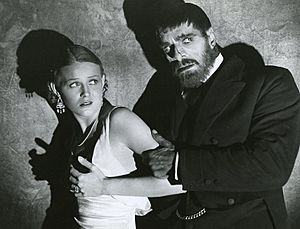
Her career grew when director James Whale chose her for his film The Old Dark House (1932). She played a wife stranded in a spooky mansion. The film was praised, and Gloria's performance was called "clever and charming." This movie later became a cult classic.
Her experience on The Old Dark House also helped create the Screen Actors Guild in 1933. This is a union for actors. Stuart became one of its first members. In 1936, she also helped form the Hollywood Anti-Nazi League. She also helped create a group to support orphans from the Spanish Civil War.
Stuart got her first co-starring role in Air Mail. She appeared in many films quickly. In 1932, she had four films released. In 1933, she had nine films. She was often in several movies at once.
After good reviews in other films, James Whale cast her in The Invisible Man (1933). She starred opposite Claude Rains, a famous actor from London. Stuart became good friends with James Whale.
Gloria's first husband, Gordon Newell, did not like Hollywood. They separated and divorced. In 1933, Stuart met Arthur Sheekman, a writer, on the set of her film Roman Scandals. They quickly fell in love and married in August 1934.
Moving to 20th Century Fox (1935–1939)
In 1934, Universal loaned Stuart to Warner Brothers for Here Comes the Navy. She co-starred with James Cagney and Pat O'Brien. Critics praised her performance.
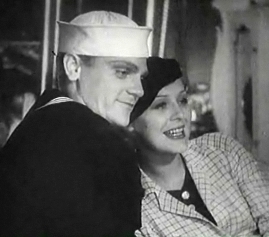
In 1935, Stuart was in the musical Gold Diggers of 1935. She was pregnant, so she did not dance or sing. Her daughter, Sylvia, was born in June 1935. Sylvia was named after a character Gloria played in Roman Scandals.
That same year, Stuart left Universal and joined Twentieth Century-Fox. She supported child stars like Freddie Bartholomew and Shirley Temple in films like Poor Little Rich Girl.
Despite some mixed reviews for her films, Stuart gained many fans. One fan even had her portrait tattooed on his chest! Life magazine featured her in a story in 1937.
In 1938, Stuart again supported Shirley Temple in Rebecca of Sunnybrook Farm. In 1939, her last year in this phase of her career, she was in The Three Musketeers.
Leaving Hollywood and Becoming an Artist (1940–1974)
In 1939, Stuart and her husband Arthur Sheekman traveled in Asia, Egypt, and Italy. They were in France when World War II began. They had to return to the United States.
In New York, Stuart wanted to act on stage. She performed in many summer theater plays between 1940 and 1942. She even starred in Our Town with the play's writer, Thornton Wilder.
During the 1940s, Stuart helped with the war effort. She toured the country with another actress, visiting hospitals and selling war bonds. She also appeared in a few more films, like Here Comes Elmer (1943) and The Whistler (1944).
After 1945, Stuart decided to stop acting. She moved to New York with her husband. She discovered découpage, an art form where you decorate objects with cut-out paper. Stuart loved it and opened her own shop in Los Angeles called Décor, Ltd. She created beautiful lamps, mirrors, and furniture. Her work was sold in famous stores across the country. However, the work was very detailed and costly, so she closed her shop.
Stuart and her husband bought a craftsman-style house. She redesigned the inside and created a beautiful garden. She said she became "a whirling dervish of creative renovation."
In 1954, while visiting Paris, Stuart saw Impressionist paintings. She was inspired to paint herself. For the next 18 months, she painted every day. In 1961, she had her first art show in New York. Almost all of her paintings sold. Her art was shown in many galleries and is now in museums like the Los Angeles County Museum of Art and the Metropolitan Museum of Art.
After painting for nearly 30 years, Stuart became interested in serigraphy, also known as silk screening. She studied it and created many vivid prints.
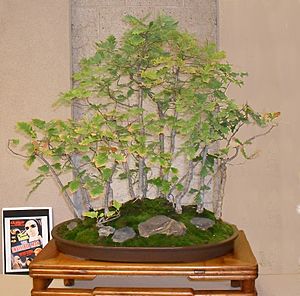
In the late 1960s, Stuart started another art form: bonsai. This is the art of growing miniature trees. She took classes and joined bonsai clubs. She eventually had over one hundred miniature trees.
Returning to Acting and Book Design (1975–1995)
In 1975, after almost 30 years, Gloria Stuart decided to act again. She got an agent and soon had a small role in a TV film. She appeared in TV series like The Waltons and Murder, She Wrote. In 1982, she had a small part in My Favorite Year, dancing with Peter O'Toole. She also appeared in Wildcats with Goldie Hawn.
Stuart's husband, Arthur Sheekman, passed away in 1978. Five years later, she met Ward Ritchie, a famous printer and book designer. They fell in love. Ritchie was 78 and Stuart was 72.
Stuart became interested in printing. She learned typesetting and bought her own printing press. She started her own private press called Imprenta Glorias. In 1984, Stuart was diagnosed with breast cancer. She was successfully treated.
In the late 1980s, Stuart began making Artist's books. She designed them, wrote the text (often poetry), and printed the pages. She decorated them with watercolors, silk screen, or découpage. Some books took her years to finish. One of her books, made with artist Don Bachardy, is owned by the Metropolitan Museum of Art.
Through Ward Ritchie, Stuart's books were placed in many famous libraries and collections around the world. Stuart and Ritchie were together for 13 years until his death in 1996.
Titanic and Later Years (1996–2010)
In May 1996, Gloria Stuart received a call about a film role. It was for a movie about the Titanic, directed by James Cameron. The casting director and James Cameron himself visited her. Stuart felt confident she would get the role of Old Rose. Five days after her 86th birthday, she was offered the part.
Most of her filming for Titanic took place in Halifax, Nova Scotia. After the movie was finished, the publicity began. Stuart was nominated for a Golden Globe Award and an Academy Award for Best Supporting Actress. At 87, she became the oldest person ever nominated for an acting Oscar.
On March 8, 1998, the Screen Actors Guild honored Stuart. She also won the award for Best Performance by an Actress in a Supporting Role for Titanic. She received a standing ovation from her fellow actors.
People magazine included Stuart in their list of "The 50 most beautiful people in the World in 1998." She also wrote her autobiography, I Just Kept Hoping.
Stuart continued to act in a few more films and TV shows. She appeared in The Love Letter (1999) and the TV series Touched by an Angel. Her last two films were for director Wim Wenders: The Million Dollar Hotel (1999) and Land of Plenty (2004).
In 2000, Stuart received her star on the Hollywood Walk of Fame. In 2010, the Academy of Motion Picture Arts and Sciences honored her career with a special event.
Stuart was diagnosed with lung cancer at age 94. She had stopped smoking many decades earlier. She received treatment, but the cancer slowly spread. She lived to be 100 years old.
On July 4, 2010, Gloria Stuart celebrated her 100th birthday. The party was hosted by James Cameron and his wife. Many of her paintings, prints, and bonsai trees were displayed at the gallery.
Culinary Interests
Gloria Stuart was a talented cook. She often hosted dinner parties in Hollywood. She was good friends with the food writer M.F.K. Fisher, who was the godmother to Gloria's daughter, Sylvia.
Sylvia later wrote about her mother's cooking. She said her mother never made simple dishes. Her cooking was complex and creative, and everyone loved it.
Activism and Politics
Gloria Stuart was a lifelong member of the Democratic Party. In 1936, she helped found the Hollywood Anti-Nazi League. In 1938, she was on the Executive Board of the California State Democratic Committee.
She was also a strong environmentalist. Stuart belonged to many organizations that worked to protect the environment. She believed that harming the environment was wrong.
Death and Legacy
Gloria Stuart passed away from respiratory failure at her home in Los Angeles on September 26, 2010. She was 100 years old. At the time of her death, she had four grandchildren and twelve great-grandchildren.
For her contributions to film, Gloria Stuart has a star on the Hollywood Walk of Fame.
Filmography
Awards and Recognition
| Year | Awards | Category | Nominated work | Result | Ref. |
|---|---|---|---|---|---|
| 1997 | Awards Circuit Community Awards | Best Supporting Actress | Titanic | Nominated | |
| Academy Awards | Best Supporting Actress | Nominated | |||
| Golden Globe Awards | Best Supporting Actress | Nominated | |||
| Kansas City Film Critics Circle Awards | Best Supporting Actress | Won | |||
| Los Angeles Film Critics Association Awards | Best Supporting Actress | 2nd place | |||
| Online Film Critics Society Awards | Best Supporting Actress | Won | |||
| Saturn Awards | Best Supporting Actress | Won | |||
| Screen Actors Guild Awards | Outstanding Performance by a Female Actor in a Supporting Role | Won | |||
| 2000 | Eyegore Awards | Eyegore Award | N/A | Honored | |
| 2010 | Screen Actors Guild Awards | Ralph Morgan Award |
Selected Artwork
Paintings
| Year | Title | Medium | Notes | Ref. |
|---|---|---|---|---|
| 1932 | Still Life | Acrylic on canvas | Formerly owned by estate of Harpo Marx; auctioned in 2014 | |
| 1950s | Flossie and the Tiger | Oil on canvas | Owned by Papillion Gallery (Los Angeles) | |
| 1954 | House in Rapallo | Oil on canvas | Owned by Papillion Gallery | |
| 1960s | Idiot's Bouquet - Melange | Oil on canvas | Owned by Papillion Gallery | |
| 1960s | Watts Towers | Oil on canvas | Owned by Los Angeles County Museum of Art | |
| 1960s | Watts Towers with Kite | Oil on canvas | Owned by Los Angeles County Museum of Art | |
| 1961 | Girl in the Armoire | Oil on canvas | Owned by Papillion Gallery | |
| 1961 | Idiot's Bouquet - Hand | Oil on canvas | Owned by Papillion Gallery; exhibited at Hammer Gallery, New York in 1961 | |
| 1963 | Idiot's Bouquet - with Wreath | Oil on canvas | Owned by Papillion Gallery | |
| 1965 | Adam and Eve | Oil on canvas | Owned by Papillion Gallery | |
| 1970 | Ladies in the Grass | Oil on canvas | Owned by Papillion Gallery | |
| 1970s | Naming of the Animals | Oil on canvas | Owned by Papillion Gallery |
Screen Prints
| Year | Title | Medium | Notes | Ref. |
|---|---|---|---|---|
| N/A | Le the Dasant | Silk screen | Signed along bottom in pencil; auctioned in 2012 |
Artist's Books
| Year | Title | Medium | Notes | Ref. |
|---|---|---|---|---|
| 1985 | March fifteenth, Nineteen eighty-three | Letterpress, silkscreen, collage, and watercolor | Owned by William Andrews Clark Memorial Library | |
| 1991 | Eve-Venus | Letterpress, silkscreen, collage, and watercolor | Owned by the Metropolitan Museum of Art | |
| 1993 | Christopher Isherwood’s Commonplace Book | Letterpress, silkscreen, collage, and watercolor | Owned by William Andrews Clark Memorial Library | |
| 1993 | Boating with Bogart | Letterpress, silkscreen | Owned by William Andrews Clark Memorial Library | |
| 1996 | The Portrait | Letterpress, silkscreen, collage, and watercolor | Collaboration with Don Bachardy; owned by the Metropolitan Museum of Art | |
| 1997 | The best motion picture of 1997: Titanic, by its author, director & producer James Cameron |
Letterpress | Owned by William Andrews Clark Memorial Library | |
| 2001 | A Slight Diversion | Letterpress, silkscreen | Owned by William Andrews Clark Memorial Library |
See also
 In Spanish: Gloria Stuart para niños
In Spanish: Gloria Stuart para niños
 | Stephanie Wilson |
 | Charles Bolden |
 | Ronald McNair |
 | Frederick D. Gregory |


